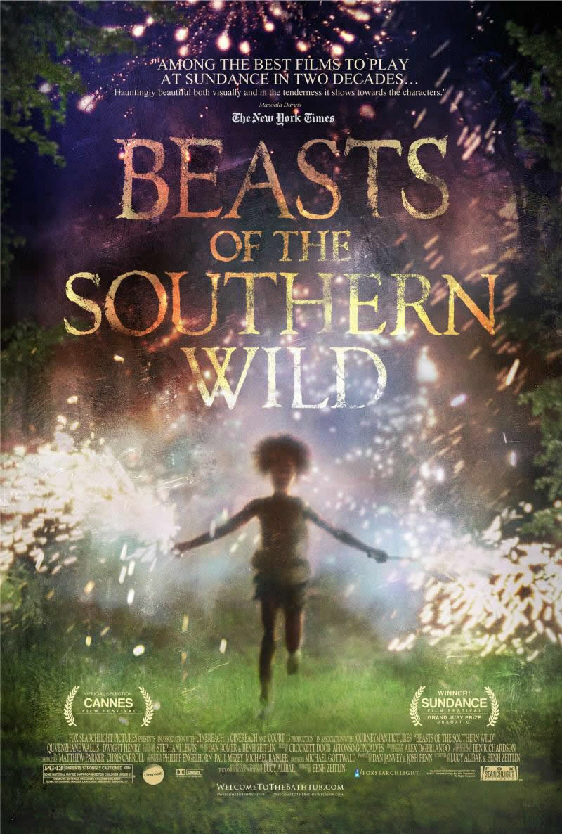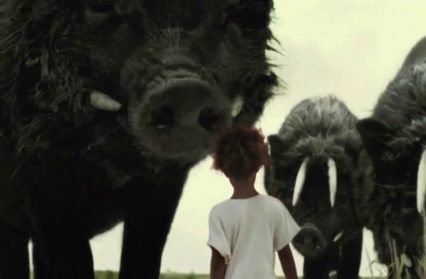Peter Gaskell reviews Beasts of the Southern Wild, Ben Zeitlin’s award-winning auroch-filled apocalyptic fantasy.
If you’re keen on film with a strong apocalyptic theme, this is a good one to see. It has been showing at Chapter Arts Centre thanks to sciSCREEN who promote films featuring science-related issues. Hooked by the logline
“Faced with both her hot-tempered father’s fading health and melting ice-caps that flood her ramshackle bayou community and unleash ancient aurochs, six-year-old Hushpuppy must learn the ways of courage and love,”
I was pleased to find it captured the scale of the apocalyptic theme from a microscopic perspective, that of a small child with no effective support or resources confronting the huge forces ranged against her.
This film is about how the most vulnerable at the margins of society are the first to face the effects of global warming, being those who have contributed least to its human causes, without being the beneficiaries of the industrialisation which caused it. The ‘hero’ is Hushpuppy, a small girl aware of her precarious place in the present but also precociously showing her potential as a beacon of hope for the future. She intuitively knows how everything in nature has a necessary place as part of the whole. The drama comes satisfyingly to a head when Hushpuppy demonstrates ‘atonement’ with the environment, personifying our best hope for the survival of our species, despite her being of the lowest possible status in the prevailing geographical and socio-economic conditions.

Director: Benh Zeitlin
Writers: Lucy Alibar Benh Zeitlin
Stars: Quvenzhané Wallis, Dwight Henry and Levy Easterly
Beasts of the Southern Wild ranges between the stark reality of managing to survive and fantasy that offers little solace as might a mirage in the desert. With a nod to Easy Rider where the bikers find relief from their alienation when they cavort hallucenogenically with hookers at the New Orleans cemetery, Hushpuppy and her young friends do briefly escape their predicament when they are ferried by a Charon-like boatman to the Elysian Fields Floating Catfish Shack. This is a bordello where the children find solace with the girls when they are having a break from entertaining the menfolk. In this version of Hades, Hushpuppy becomes enchanted by one of the hookers who takes her under her wing, showing her how to cook up a heavenly gumbo stew such as she’s never eaten before. Without giving too much away, she is being prepared for her post-apocolypse role before she returns from the Underworld to face the future as a homeless orphan.
Hushpuppy is narrator as well as heroine. The events we see are processed as though through her eyes as she tries to make sense of them. This doesn’t always work convincingly and the narrative is confusing and obscure at times. We see a map of her location, the Bathtub being outside the levee which protects the mainland, exposing her community more to the effects of hurricanes and rising sea levels. Then there appears to be an attempt to blow up the levee as if this will drain out their homeland, resulting in the devastation of its flora and fauna.
The film had its technical flaws too. I found the diction hard to follow, the main characters not being trained actors, and the camerawork amateurish, often shaky and blurred for no good reason. Its sometimes incoherent narrative felt rather laboured, pretentious even but I thought the main theme and characterisation worked well.
After the Sunday showing, sciSCREEN hosted a discussion forum. The event being sponsored by the British Science Association, four Cardiff University academics related the film to ideas about climate change, flood risk, apocalyptic narratives, and the resurrection of extinct species, an element of the film that appeared to be pure fantasy but, the scientists assured us, not in reality. After seeing a film, we all like to talk about it as we digest it. This event added another dimension to that and sciSCREEN are to be commended.
Peter Gaskell also contributes to the Atlanta Review where he is published in their current edition featuring poets from Cornwall and Wales












